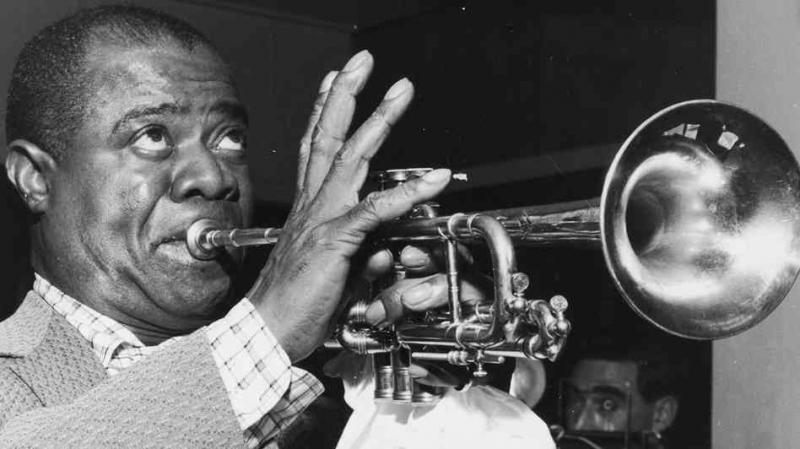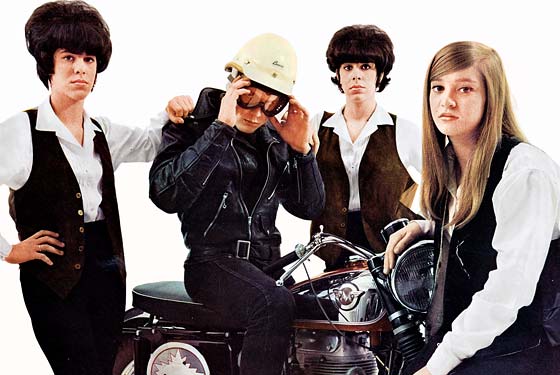Britain's Most Dangerous Songs: Listen to the Banned, BBC Four | reviews, news & interviews
Britain's Most Dangerous Songs: Listen to the Banned, BBC Four
Britain's Most Dangerous Songs: Listen to the Banned, BBC Four
Stories of the tunes the Beeb refused to play

The most notorious case of the BBC banning a pop record was the episode of the Sex Pistols' "God Save the Queen" in 1977, which was of course the year of Her Maj's Silver Jubilee. "That was genuinely dangerous," Paul Morley intoned gravely (the record that is, rather than its banning), though as with several of the cases examined here, this one wasn't quite as open and shut as it seemed.
The Beeb had been cheerfully - or at least unprotestingly - airing the disc on radio until the moment when the band swore at Bill Grundy on TV. It was Malcolm McLaren's bizarrely-dressed band of urchins running amok across the beige prairies of teatime telly that freaked the BBC out. This evidently seemed to them more likely to unseat the monarch or send the remains of Empire to the bottom of the sea than the Pistols' coruscating recordings.
 It was the lesser-known examples of banning-hood that supplied the most intriguing parts of this entertaining (if not too profound) doc. For instance, during World War Two the Corporation became extremely hostile to crooners from the USA, seemingly because their "American sentimentalisation of emotion" threatened to undermine the nation's fighting spirit. Bing Crosby's "I'll Be Home for Christmas" was singled out for special opprobrium.
It was the lesser-known examples of banning-hood that supplied the most intriguing parts of this entertaining (if not too profound) doc. For instance, during World War Two the Corporation became extremely hostile to crooners from the USA, seemingly because their "American sentimentalisation of emotion" threatened to undermine the nation's fighting spirit. Bing Crosby's "I'll Be Home for Christmas" was singled out for special opprobrium.
Wind back to the 1930s, and we found that cheeky George Formby (above, meeting his critics) was a serial offender with his ridiculous - though suggestive - songs about "My Little Ukulele" (which was banned and then unbanned after a judicious title-change) or, even worse, "My Little Stick of Blackpool Rock", up with which the BBC indignantly refused to put. It was time for a bit of sociology to prop all this up, so writer Lucy O'Brien popped in with a soundbite about the Corporation "censoring working class expression", since ghastly northerners like Formby or Gracie Fields weren't considered quite proper for the London-centric middle classes amid whom the BBC plied its trade.
In 1956 the Beeb's draconian Dance Music Policy Committee (a sort of pipe-smoking Gestapo of the airwaves) took umbrage at Louis Armstrong's recording of "Mac the Knife", Brecht and Weill's lurid depiction of the unsavoury Macheath. The song's allusions to the grotesque crimes of Jack the Ripper didn't go down well with the Committee, but as Christopher Frayling pointed out, what really got them going was a spate of real-life knife crimes which happened to be in the news at the time.
 There was a very good bit about the Shangri-Las' "Leader of the Pack", with Mark Ellen delivering a comic overview of the strange phenomenon of "splatter platters" as we pondered how the BBC banned this tale of a tragically defunct motorcyclist in a climate of warring Mods and Rockers in British seaside resorts (The Shangri-Las, above). Meanwhile, it was almost shocking to be reminded of the Corporation's erstwhile hypersensitivity about product placement. It's barely noticeable nowadays, but it caused them to suppress Mott the Hoople's "All the Young Dudes" until its writer David Bowie removed a line about "stealing clothes from Marks and Sparks " - how the struggling M&S would love to catch pop stars nicking their gear now! - and also meant zero tolerance for songs like Dr Hook's "Cover of the Rolling Stone", the Kinks' "Lola" and Paul Simon's "Kodachrome".
There was a very good bit about the Shangri-Las' "Leader of the Pack", with Mark Ellen delivering a comic overview of the strange phenomenon of "splatter platters" as we pondered how the BBC banned this tale of a tragically defunct motorcyclist in a climate of warring Mods and Rockers in British seaside resorts (The Shangri-Las, above). Meanwhile, it was almost shocking to be reminded of the Corporation's erstwhile hypersensitivity about product placement. It's barely noticeable nowadays, but it caused them to suppress Mott the Hoople's "All the Young Dudes" until its writer David Bowie removed a line about "stealing clothes from Marks and Sparks " - how the struggling M&S would love to catch pop stars nicking their gear now! - and also meant zero tolerance for songs like Dr Hook's "Cover of the Rolling Stone", the Kinks' "Lola" and Paul Simon's "Kodachrome".
But the most thought-provoking specimen came last, which was the cunningly-planned online promotion of "Ding Dong! The Witch Is Dead" to un-mourn Margaret Thatcher's death last year. "They don't ban things any more, they just don't play them," said music journalist Jon Robb, though in this case the Beeb elected to play just a few seconds of the song. The publicly-funded broadcaster could hardly have risked seeming to dance on the grave of this particular 87-year-old dementia sufferer.
Add comment
The future of Arts Journalism
You can stop theartsdesk.com closing!
We urgently need financing to survive. Our fundraising drive has thus far raised £49,000 but we need to reach £100,000 or we will be forced to close. Please contribute here: https://gofund.me/c3f6033d
And if you can forward this information to anyone who might assist, we’d be grateful.

Subscribe to theartsdesk.com
Thank you for continuing to read our work on theartsdesk.com. For unlimited access to every article in its entirety, including our archive of more than 15,000 pieces, we're asking for £5 per month or £40 per year. We feel it's a very good deal, and hope you do too.
To take a subscription now simply click here.
And if you're looking for that extra gift for a friend or family member, why not treat them to a theartsdesk.com gift subscription?
more TV
 theartsdesk Q&A: director Stefano Sollima on the relevance of true crime story 'The Monster of Florence'
The director of hit TV series 'Gomorrah' examines another dark dimension of Italian culture
theartsdesk Q&A: director Stefano Sollima on the relevance of true crime story 'The Monster of Florence'
The director of hit TV series 'Gomorrah' examines another dark dimension of Italian culture
 The Monster of Florence, Netflix review - dramatisation of notorious Italian serial killer mystery
Director Stefano Sollima's four-parter makes gruelling viewing
The Monster of Florence, Netflix review - dramatisation of notorious Italian serial killer mystery
Director Stefano Sollima's four-parter makes gruelling viewing
 The Diplomat, Season 3, Netflix review - Ambassador Kate Wyler becomes America's Second Lady
Soapy transatlantic political drama keeps the Special Relationship alive
The Diplomat, Season 3, Netflix review - Ambassador Kate Wyler becomes America's Second Lady
Soapy transatlantic political drama keeps the Special Relationship alive
 The Perfect Neighbor, Netflix review - Florida found-footage documentary is a harrowing watch
Sundance winner chronicles a death that should have been prevented
The Perfect Neighbor, Netflix review - Florida found-footage documentary is a harrowing watch
Sundance winner chronicles a death that should have been prevented
 Murder Before Evensong, Acorn TV review - death comes to the picturesque village of Champton
The Rev Richard Coles's sleuthing cleric hits the screen
Murder Before Evensong, Acorn TV review - death comes to the picturesque village of Champton
The Rev Richard Coles's sleuthing cleric hits the screen
 Black Rabbit, Netflix review - grime and punishment in New York City
Jude Law and Jason Bateman tread the thin line between love and hate
Black Rabbit, Netflix review - grime and punishment in New York City
Jude Law and Jason Bateman tread the thin line between love and hate
 The Hack, ITV review - plodding anatomy of twin UK scandals
Jack Thorne's skill can't disguise the bagginess of his double-headed material
The Hack, ITV review - plodding anatomy of twin UK scandals
Jack Thorne's skill can't disguise the bagginess of his double-headed material
 Slow Horses, Series 5, Apple TV+ review - terror, trauma and impeccable comic timing
Jackson Lamb's band of MI5 misfits continues to fascinate and amuse
Slow Horses, Series 5, Apple TV+ review - terror, trauma and impeccable comic timing
Jackson Lamb's band of MI5 misfits continues to fascinate and amuse
 Coldwater, ITV1 review - horror and black comedy in the Highlands
Superb cast lights up David Ireland's cunning thriller
Coldwater, ITV1 review - horror and black comedy in the Highlands
Superb cast lights up David Ireland's cunning thriller
 Blu-ray: The Sweeney - Series One
Influential and entertaining 1970s police drama, handsomely restored
Blu-ray: The Sweeney - Series One
Influential and entertaining 1970s police drama, handsomely restored
 I Fought the Law, ITVX review - how an 800-year-old law was challenged and changed
Sheridan Smith's raw performance dominates ITV's new docudrama about injustice
I Fought the Law, ITVX review - how an 800-year-old law was challenged and changed
Sheridan Smith's raw performance dominates ITV's new docudrama about injustice
 The Paper, Sky Max review - a spinoff of the US Office worth waiting 20 years for
Perfectly judged recycling of the original's key elements, with a star turn at its heart
The Paper, Sky Max review - a spinoff of the US Office worth waiting 20 years for
Perfectly judged recycling of the original's key elements, with a star turn at its heart

Comments
This programme was little
And 'Listen to the Banned',
And 'Listen to the Banned', while maybe it's not copyright, is the title of a wonderful compilation of censored songs from other cultures put together by the courageous Deeyah, who now lives in Norway. If the 'posh, white elite' could give her airspace, that would be something.
Good point, David - Deeyah's